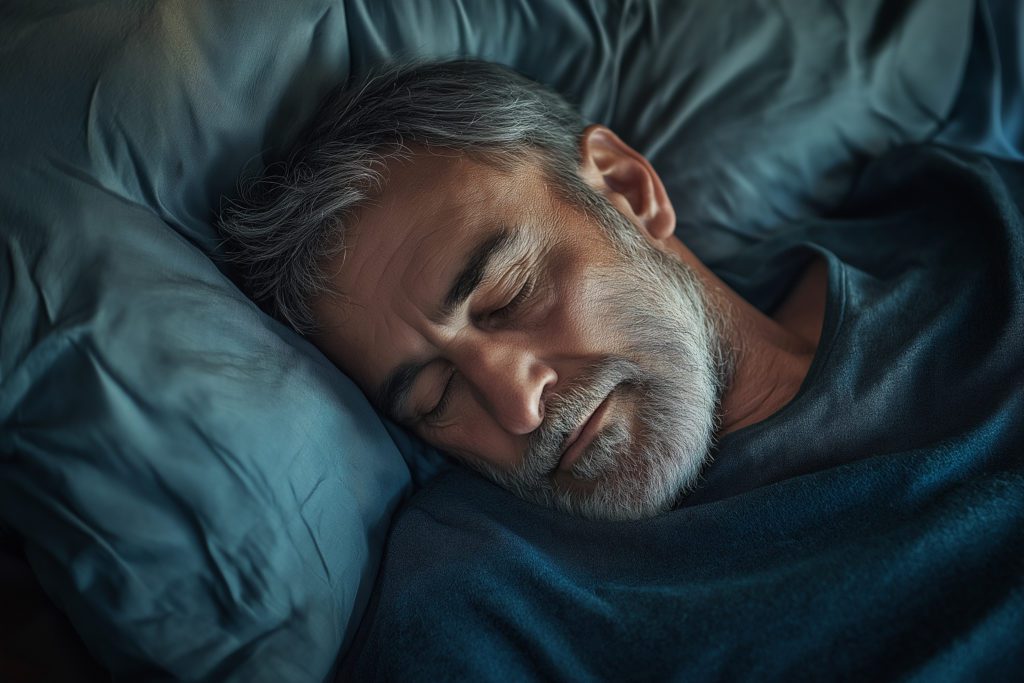
Sleep Disorders in Alzheimer’s Patients: Common Types and Management Strategies
Explore common sleep disorders in Alzheimer’s patients and practical management strategies for caregivers to promote better sleep and quality of life.

If you know someone with Alzheimer’s Disease, they may have a sleep disorder. According to an article published in Frontiers in Neuroscience, 24.5% of all patients who have a mild or moderate form of Alzheimer’s actually are also diagnosed with a sleep disorder. While this is not a majority of patients, it is still considerable enough to discuss what sort of sleep disorders they suffer from, as well as how to manage these sleep challenges.
From insomnia to REM sleep behavior disorder, we’ll discuss each of these disorders and why they are common in patients who have Alzheimer’s Disease. We’ll also explore some management strategies to help alleviate the potential impact of these sleep disorders, ensuring that you or your loved one always enjoys quality rest, regardless of what sleep disorder they may also be struggling with.
1. Insomnia
One of the most common sleep disorders in patients who have Alzheimer’s Disease is insomnia, which can affect up to 35% of those with dementia. This is a startling rate, but it shows just how common this disorder is with patients who have Alzheimer’s or other forms of dementia. These patients struggle with increased reliance on caregivers and may also have a lower quality of life because of their inability to sleep adequately. Fortunately, there are ways to manage this to ensure a good night’s rest.
How to Manage Insomnia
When it comes to insomnia in Alzheimer’s patients, people can either choose to implement some lifestyle changes or proceed with medications that can help with sleep. For many patients already on so many medications, sleep education and practicing better sleep practices is the best way to manage insomnia. This means getting exposure to daytime light outside, socializing, timing medications appropriately, and also avoiding caffeine or alcohol, which can be triggers for insomnia.
2. Sundowning
Another common sleep disorder many with Alzheimer’s Disease may present is sundowning, which is when patients may be irritable, restless, or agitated, especially as the daytime fades. This can even continue into the nighttime, and it can make it difficult for people to get adequate rest, for both caregivers and those who have Alzheimer’s Disease. Essentially, what happens is the person’s internal clock is confused, and they cannot sleep at the time that they usually do.
How to Manage Sundowning
With sundowning, it is not as easy to manage with medication, but it can be handled by other means. If you are caring for a loved one and they begin to experience an episode of sundowning, you should reduce the noise and the distractions in the room and try to get your loved one to focus on something else, like a light chore or a TV show that they like.
You can also make the evening a quiet time for everyone, potentially playing music or going for a walk to help them relax. Natural light is also a great way to try and combat this situation. Sundowning may not be easily stopped, but these methods can help alleviate the stress your loved one may feel during their sundowning episode.
3. Sleep Apnea
Another common sleep disorder that many people with Alzheimer’s Disease struggle with is sleep apnea, which can be difficult and dangerous as it stops your breathing temporarily during sleep and infrequently. With sleep apnea, unlike other conditions, there may be more happening that is not just about stress but about one’s physical health, too. That’s why managing sleep apnea for Alzheimer’s patients can be difficult, but it is necessary. Here are some ways that you can manage this sleep disorder in patients with Alzheimer’s Disease.
How to Manage Sleep Apnea
Sleep apnea can be managed in a few different ways for those with Alzheimer’s Disease. However, one of the most effective is the use of a CPAP machine to help with breathing. Studies showed that those with Alzheimer’s Disease and sleep apnea actually saw a noticeable improvement in their verbal learning, memory, and executive functions (Source: PubMed). Over time, people’s sleep and mood also improved, showing that this can help in the long term and even lead to delayed cognitive decline.
4. REM Sleep Behavior Disorder (RBD)
REM sleep behavior disorder, or RBD, is characterized by the ability to unconsciously act out dreams and even nightmares. This can be debilitating to those with Alzheimer’s Disease, or anyone for that matter, but one of the most challenging parts of having this is the potential for injuries. With the potential for moving limbs and more, something has to be done to protect the patients.
How to Manage RBD
With this sleep disorder, due to its unique symptoms, the best thing to do would be to protect the patient with Alzheimer’s Disease as much as possible. Many people have turned to treatment plans that include protecting the environment and providing protective barriers or cushions for those who might wake up, walk around, or kick something that could lead to a bruise or even injuring themselves.
However, another viable way to manage this is to have a partner sleeping in the same room to ensure that they do not get injured. This can work for situations where the RBD is less aggressive, yet some people turn to medications. The major downside of medications is that, unfortunately, they may worsen symptoms of sleep apnea if people already have this condition (Source: PubMed).
Taking Steps to Improve Sleep for Alzheimer’s Patients
If you are caring for an Alzheimer's patient or a loved one with a disease that also has a sleep disorder, it can be difficult. Nevertheless, by understanding the common sleep disorders that are associated with this neurodegenerative disease, you can take steps to promote their health and wellness.
From insomnia to RBD, there are many ways to treat these sleep disorders, ensuring that you manage the symptoms, either by lifestyle changes or medication. While not all medications will work as effectively, you still may be able to find a suitable option so that you can protect your patient’s health, ensuring that they get good rest and limit their unpleasant symptoms as much as possible.
FAQ
Is there a connection between REM sleep and Alzheimer's Disease?
Reduced REM sleep has been linked to higher levels of amyloid and tau proteins, both associated with Alzheimer’s. Since REM sleep is essential for memory consolidation, disturbances in this phase may accelerate cognitive decline and serve as an early warning sign of the disease.
Can improving sleep quality reduce the risk of developing Alzheimer's Disease?
Poor sleep may contribute to Alzheimer’s by allowing harmful proteins to accumulate in the brain. Good sleep hygiene—such as maintaining a consistent bedtime, avoiding screens before sleep, and managing stress—can help protect brain health and potentially lower the risk of cognitive decline.
What environmental changes can help improve sleep in Alzheimer’s patients?
A sleep-friendly environment includes a dark, cool, and quiet bedroom. Soft music, white noise, and motion-activated nightlights can reduce disorientation. Avoiding caffeine, large meals, and stimulating activities before bedtime can also help Alzheimer’s patients sleep more soundly.
How do changes in brain chemistry contribute to sleep disturbances in Alzheimer's?
Alzheimer’s disrupts brain chemistry, affecting sleep-wake cycles. Sleep disorders reduce amyloid-beta clearance, leading to plaque buildup and faster neurodegeneration. This creates a cycle where poor sleep worsens Alzheimer’s, and the disease further disrupts sleep, accelerating cognitive decline.
Are naps beneficial or harmful for Alzheimer's patients?
Short naps (20-30 minutes) can improve mood and alertness, but excessive daytime sleeping can worsen nighttime wakefulness. Alzheimer’s patients who nap too much during the day may experience insomnia or disrupted nighttime sleep, creating a cycle of increased confusion and restlessness.
What are the challenges in diagnosing sleep disorders in Alzheimer's patients?
Sleep disturbances in Alzheimer’s can be hard to diagnose because symptoms overlap with cognitive decline. Patients may struggle to express sleep issues, requiring sleep studies for accurate diagnosis. Caregivers’ observations play a crucial role in identifying sleep problems.
How does sleep apnea impact individuals with Alzheimer's Disease?
Sleep apnea, which causes breathing interruptions during sleep, leads to fragmented rest and oxygen deprivation. In Alzheimer’s patients, this worsens memory issues and confusion. Treatment with CPAP devices or lifestyle changes, such as weight management, may improve sleep and cognitive function.

Written by
Marie Soukup
Marie Soukup is a seasoned copywriter, editor, and Integrative Nutrition Health Coach with a certificate from the Institute of Integrative Nutrition (IIN). With years of experience working with brands across diverse industries, Marie is passionate about holistic health and crafting compelling content.
Download Pillow
Get help
Press & News
Legal
Connect
X (Twitter)
Company
Copyright © Neybox Digital Ltd.



